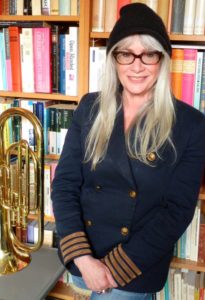University of Victoria professor Jennifer Wise has long held a passion for site-specific dramatic performances based on little-known histories of Victoria. Having cut her teeth on her original production, The Girl Rabbi of the Golden West, Wise is now working with director Matthew Payne and students of the UVic theatre program on A Queer Trial, the recently uncovered story of John Butt, a gay man who stood trial in Bastion Square in 1860 on charges of sodomy. In particular, Wise, who wrote the play, was fascinated by the fact that an openly gay man managed to escape conviction under jury in the mid-19th century.
“That was the big riddle, wasn’t it?” says Wise. “Thirty years after the story of John Butt, Oscar Wilde was condemned to hard labour in jail for the same crimes. So how was it possible that this off-the-beaten-path, nowhere city, off in the Pacific Ocean, in the wild west of Vancouver Island, was 30 years more progressive than cosmopolitan London? And yet, in this little town, this little unknown town called Victoria, the citizens were progressive and tolerant and humane and compassionate enough to let this guy off.”

Wise says that what makes Butt’s tale all the more astounding is the fact that he was very open about his sexual life and tastes with the rest of the community, despite the explicit anti-homosexual laws that remained widely enforced.
“He made no secret of it,” Wise says. “He went into butcher shops in downtown Victoria and openly propositioned men by saying, ‘Hey,’ you know, ‘I’d like to have you in bed with me.’”
Wise felt that the expression of the story in musical form was important due to the role that music played in the period the performance is set in.
“In 1860, there wasn’t even a phonograph,” she says. “There was no recording at all. There was no recorded music in existence. If you wanted music, you had to make it yourself. So to convey the feeling of Victoria in that period, I think music is pretty important. But also, thematically, I wanted to celebrate John Butt. And how do you best celebrate someone’s life? You sing about it.”
Wise says that she also discovered in researching John Butt’s life that he was known for his tenor voice and sang in a choir.
“Many of the people who knew him and reminisced and told stories about him—in fact, all of them—remarked on his beautiful singing voice. So, I thought, ‘How can I do justice to this guy if I don’t have music in the play?’”
Wise paid especially close attention to her portrayal of the normalized bigotry that played a central role in Victorian society of the time, particularly as scores of American immigrants brought with them less tolerant views than many of those found in Victoria.
“So how do you deal with racism or homophobia? How do you deal with really awful, obnoxious views? I think you have to laugh at them,” says Wise. “That’s the only way. So I do have some American characters in the play, and some racist and xenophobic and homophobic characters, but we laugh at them. We let them say what they want to say and then we show how absurd and ridiculous those ideas are.”
A Queer Trial
6 pm, Thursday, April 13 (preview)
2 pm and 4 pm, Friday April 14
Free, Bastion Square
finearts.uvic.ca/theatre/50th/trial
